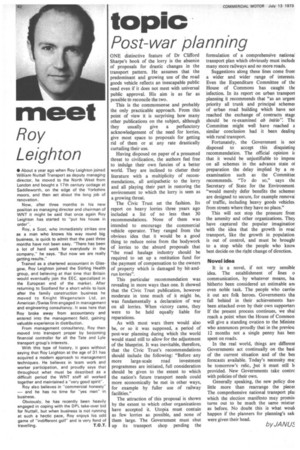topic
Page 44

If you've noticed an error in this article please click here to report it so we can fix it.
Post-war planning
ONE distinctive feature of Dr Clifford Sharpe's book of the lorry is the absence of proposals for drastic changes in the transport pattern. He assumes that the predominant and growing use of the road goods vehicle reflects an inescapable public need even if it does not meet with universal public approval. His aim is as far as possible tb reconcile the two.
This is the commonsense and probably the only practicable approach. From this point of view it is surprising how many other publications on the subject, although they usually give a perfunctory acknowledgement of the need for lorries, give most space to proposals for getting rid of them or at any rate drastically curtailing their use.
Having disposed on paper of a presumed threat to civilization, the authors feel free to indulge their own fancies of a better world. They are inclined to clutter their literature with a multiplicity of recommendations, all antipathetic to the lorry and all playing their part in restoring the environment to which the lorry is seen as a growing threat.
The Civic Trust set the fashion. Its report on heavy lorries three years ago included a list of no less than 30 recommendations. None of them was intended to encourage the commercial vehicle operator. They ranged from the obvious idea that it would be a good thing to reduce noise from the bodywork of lorries to the absurd proposals that "the road haulage industry should be required to set up a restitution fund for the payment of compensation to the owners of property which is damaged by hit-andrun lorries".
This particular recommendation was revealing in more ways than one. It showed that the Civic Trust publication, however moderate in tone much of it might be, was fundamentally a declaration of war on all lorries. When victory came, they were to be held equally liable for reparations.
As with most wars there would also be, or so it was supposed, a period of post-war planning during which the world would stand still to allow for the adjustment of the blueprint. It was inevitable, therefore, that the Civic Trust's recommendations should include the following: "Before • any more large-scale road investment programmes are initiated, full consideration should be given to the extent to which the nation's future transport needs could more economically be met in other ways, for example by fuller use of railway facilities."
The attraction of this proposal is shown by the extent to which other organizations have accepted it. Utopia must contain as few lorries as possible, and none of them large. The Government must shut up its transport shop pending the formulation of a comprehensive national transport plan which obviously must include many more railways and no more roads.
Suggestions along these lines come from a wider and wider range of interests. Even the Expenditure Committee of the House of Commons has caught the infection. In its report on urban transport planning it recommends that "as an urgent priority all trunk and principal schemes of urban road building which have not reached the exchange of contracts stage should be re-examined ab initio". The Committee might well have reached a similar conclusion had it been dealing with rural transport.
Fortunately, the Government is not disposed to accept this disquieting recommendation. The official opinion is that it would be unjustifiable to impose on all schemes in the advance state ol preparation the delay implied by a reexamination such as the Committee recommends. "To do so," says the Secretary of State for the Environment "would merely defer benefits the schemes are designed to secure, for example removal of traffic, including heavy goods vehicles from streets where they have no place."
This will not stop the pressure from the amenity and other organizations. They have captured the popular imagination with the idea that the growth in rok transport, like the growth in population is out of control, and must be brougla to a stop while the people who know best decide on the right change of direction.
Novel idea
It is a novel, if not very sensible idea. The establishment of lines o communication, by whatever means, ha hitherto been considered an estimable am even noble task. The people who curie+ it out are folk heroes. Governments tha fall behind in their achievements hay been attacked even by their own supporters. If the present process continues, we shal reach a point when the House of Common will give a standing ovation to the Ministe who announces proudly that in the previou 12 months not a single penny has bee] spent on roads.
In the real world, things are different Governments act continually on the basi of the current situation and of the bet forecasts available. Today's necessity ma: be tomorrow's relic, but it must still b provided. New Governments take contrc with policies of their own.
Generally speaking, the new policy doe little more than rearrange the pieces The comprehensive national transport pin which the election manifesto may promisi turns out to be much the same mixtur as before. No doubt this is what woull happen if the planners for planning's sak
were given their head. byJANW
































































































